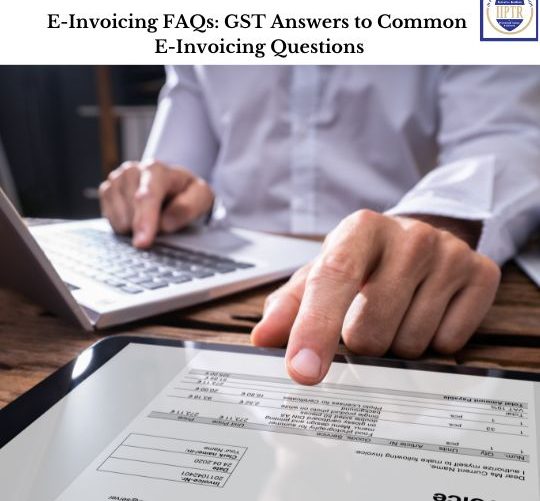The GST e-Invoicing system became active on October 1st, 2020, for taxpayers with more than Rs. 500 crores in income. On January 1, 2021, e-invoicing was expand to firms having a combine yearly revenue of more than Rs 100 crore.
On March 8, 2021, the CBIC also announced the availability of the e-invoicing system for firms with a total turnover of Rs. 50 crores to Rs. 100 crores commencing April 1, 2021. Following that, the government increase the usage of E-invoicing to enterprises with more than Rs 20 crore in revenue as of April 1, 2022. Beginning October 1, 2022, the system was recently expand to include firms with an income of more than Rs 10 crore.
Thus, for e-invoicing, the total turnover will include all GSTINs in India that are connect with a single PAN. If you have many GSTINs, you may use the GST search tool to check and confirm the GSTIN for which you want to generate the e-invoice.
Read This blog addresses some frequently asked questions about the GST e-invoicing system:
Q: What is GST e-invoicing?
E-invoicing under GST refers to a system in which a taxpayer’s invoice is validated by the Invoice Registration Portal (IRP) and a unique Invoice Reference Number (IRN) is produced. The IRN, together with other invoice data, is subsequently return to the taxpayer and used to prepare GST returns.
Q: Who must create e-invoices under GST?
Taxpayers with a combined annual revenue of more than Rs. 50 crores are expecte to create e-invoices for B2B transactions.
Q: What are the advantages of GST e-invoicing?
- E-invoicing under GST has various advantages, including:
- Errors in the invoicing process have been reduce.
- Faster invoice processing
- Data entry needs are being reduce.
- Reduced likelihood of false invoicing
- Enhanced compliance
Q: How can I create an e-invoice for GST purposes?
Accounting or invoicing software connected with the Invoice Registration Portal (IRP) can be used to create an e-invoice or Tax Invoice. The program will create a JSON file with the invoice data, which will then be upload to the IRP for authentication.
Q: Is there a GST format for e-invoices?
Yes, the GST e-invoice format is based on the GST invoice format and includes extra information such as the IRN and QR code.
Q: What is the Invoice Registration Portal’s (IRP) function in GST e-invoicing?
The Invoice Registration Portal (IRP) is responsible for validating e-invoices issued by taxpayers and assigning each invoice a unique Invoice Reference Number (IRN). The IRP also creates a QR code with the invoice data, which the receiver can use for verification.
Q: What are the consequences of non-compliance with GST e-invoicing?
Failure to comply with e-invoicing requirements under GST might result in fines ranging from Rs. 10,000 to Rs. 1,000,000.
Q: Can I cancel a GST-generated e-invoice?
Yes, an e-invoice create under GST can be revoke within 24 hours. Thus the cancellation must be communicate to the IRP and the original invoice’s receiver.
Q: Is e-invoicing required for GST-registered exports?
No, e-invoicing is not require for GST-registered exports. However, the government has advised exporters to develop e-invoices for exports to boost efficiency and eliminate mistakes.
Q: What is the timetable for implementing e-invoicing under GST?
Thus the adoption of e-invoicing under GST was done in stages. Initially, it was declare mandatory for taxpayers with an annual revenue of Rs. Thus 500 crores or more beginning October 1, 2020. Later, on January 1, 2021, it was made require for taxpayers with an annual revenue of Rs. 100 crores or more. Finally, it was necessary for taxpayers with an annual income of Rs. Thus 50 crores or higher as of April 1, 2021.
Q: Can e-invoicing be use for all sorts of GST transactions?
No, only B2B transactions are now oblige to use e-invoicing under GST.
Q: Is there a limit to the number of invoices that may be create under GST utilizing e-invoicing?
No, there is no restriction to the number of invoices that can be create under GST utilizing e-invoicing.
Q: Can I utilize e-invoicing for transactions conducted through e-commerce platforms?
Yes, e-invoicing may be utilize for transactions done through e-commerce platforms.
Q: Do I have to produce e-way bills separately for GST-generated e-invoices?
No, the e-invoice created under GST will contain all the information required to generate an e-way bill. As a result, e-way bills for GST e-invoices do not need to be create individually.
Q: Do I need special accounting or invoicing software to generate e-invoices under GST?
No exceptional accounting or invoicing software is necessary to generate GST e-invoices. The software utilizes, however, must be connect with the Invoice Registration Portal (IRP).
Q: What is the distinction between an e-invoice and a digital invoice?
Yes, there is a distinction between an e-invoice and a digital invoice. An e-invoice is a digital invoice that has been validate by the Invoice Registration Portal (IRP) and has a unique Invoice Reference Number (IRN).
For more information, Visit us at: https://www.iiptr.com/

